#Wellington Museum
Explore tagged Tumblr posts
Text

Antonio Canova, Napoleon as Mars the Peacemaker, Wellington Museum (Apsley House), London
I'm speechless...
23 notes
·
View notes
Text


Have a look in the mirror! I'm sure nothing bad will happen
27 notes
·
View notes
Text
The true old man fucker behavior is simping over historical figures
#fernando alonso this mark webber that 🥱🙄#arthur wellesley 1st duke of wellington 😍😍😍#im so sorry#i just have these weird moments when im in a museum or when im looking at Wikipedia#and im looking at some historical figure like 'why he kinda 😳'#you guys know my weird obsession with napoleon i digress#i wanted to see who was on the other side for Waterloo bcs au ideas and all that#and why he kinda 🫣🫣🫣#also Napoleon II was kinda a twink hehehe#and pls tell me why i was reading Napoleon's wikipedia and kinda being 🤭 over him#ngl in the personality/image section of his wikipedia theres a lot of nando coded stuff#such as:#surrounding himself with taller men that called him affectionate nicknames abt his height. okay. whore.#AND ALSO#'he had to win at everything he attempted' that is literally almost verbatim what nando said abt himself in his documentary#please someone stop me from making a quote comparison post about that#most normal behavior: saying fernando is napoleon coded#but seriously i think their personalities are not that different#in the au i think nando would be napoleon actually bcs of renault and bcs of the thematic similarities#would being in McHonda and then his retirement be being sent to Saint Helena?#....is Aston Martin the Waterloo before Elba.......#the parallels are paralleling!#just wanted to joke about my weirdness abt historical figures and then gave my thesis abt Napoleon = Fernando#i apologize(thats a lie)#catie.rambling.txt
43 notes
·
View notes
Text
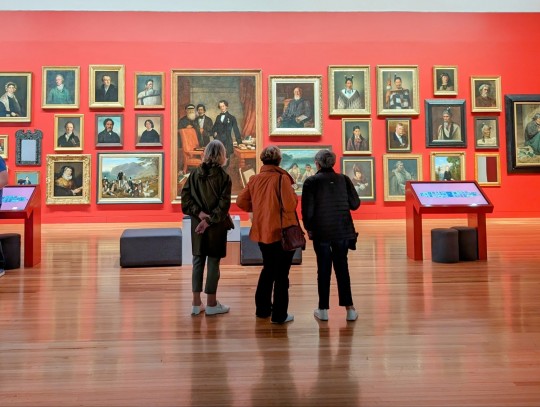
Te Papa Museum in Wellington, Aotearoa
05.03.2024
#travel#abroad#museum#artwork#art#portrait#history#maori culture#te papa#wellington#aotearoa#new zealand
10 notes
·
View notes
Text

So, the 1st Duke of Wellington would have turned 235 on May 1st (or April 30th, or April 29th, but we're going with May 1st because he did). And, uh, I may have recently done a bit of a long post for the @napoleonic-sexyman-tournament on the Duke from this account, 'cause this is the tumblr that I'm logged in on my computer and I was too lazy to sign out, sign into my gen blog and then have to sign out and sign back into this one. I also may have run out of ideas again for new stuff and gone wandering around the V&A's collection and searched for the Duke of Wellington and found this gorgeous miniature. So in honor of the Duke, have a new painting!
Richard Cosway painted the miniature in watercolors on ivory in 1808, when then (Major or Lieutenant) General Sir Arthur Wellesley was nearly 40, just as he was beginning his Peninsular adventures. One of my favorite details of this work is his beautiful blue eyes, which so often look brown in other paintings I've seen.
Base game compatible. Comes in 7 frame swatches.
Download from SimFileShare here.
Oh and as a bonus, you can have these sketches of Wellington too.
#sims 4#simblr#the sims 4#sims#ts4#my cc#sims 4 cc#ts4cc#ccsaturday#ts4 custom content#arthur wellesley#duke of wellington#1st duke of wellington#ts4 deco#ts4 historical#ts4 historical cc#richard cosway#victoria and albert museum#shockingly V&A has tons of Wellington-related stuff#and almost nothing related to Melbourne#which i find hilarious#am i obsessed?#quite possibly#ts4 painting#ts4 paintings#ts4 regency#ts4 regency cc
9 notes
·
View notes
Text
just remembered I saw a young boy at the museum today get excited and call out for his mum and i looked at what he was looking at and it was a picture of a woman in a hijab and then I saw his mum who was also wearing a hijab and had a big smile on her face
18 notes
·
View notes
Text

















Bank of Canada first opened on 234 Wellington Street in Ottawa on March 11, 1935.
#Bank of Canada Museum Plaza#Bank of Canada#first opened#11 March 1935#234 Wellington Street#Bank of Canada Building#Sumner Godfrey Davenport#Art Deco#Arthur Erickson#night shot#daylight#Ottawa#summer 2018#2015#architecture#vacation#original photography#cityscape#landmark#illuminated#anniversary#Canadian history#travel#tourist attraction#reflection#Ottawa River#Gatineau#Québec#Parliament Hill
6 notes
·
View notes
Photo

Schooner Yacht Esmeralda Approaching Cherbourg, 1861 by Arthur Wellington Fowles, oil on canvas, 1861Private Collection
#Arthur Wellington Fowles#fineart#art#painting#artwork#masterpiece#fineartprint#gallery#museum#yacht#cherbourg#oil painting
15 notes
·
View notes
Text
20 June 2023
A Royal Fellowship of Death
London 20 June 2023
Sometimes a memorial becomes so ubiquitous in the landscape that you forget its a memorial. Take the Arc de Triomphe. It’s as ‘top down’ as a memorial ever was, but it is technically a war memorial, commemorating Napoleon’s battles and marshals. Arguably the Washington Monument is the same. And so, of course, is the Wellington Arch. In fact, the Wellington Arch doesn’t just commemorate Old Nosey’s victories in Flanders, Portugal and Spain, it serves as the epicentre of a small cluster of war memorials, just down the road from Buckingham Palace.
We started today at Victoria Station, visiting the memorial to the war dead of both the London, Brighton and South Coast Railway during the First World War and the Southern Railway of the Second. (For the uninitiated, the LBSCR was amalgamated with several other south coast railway companies to form the Southern in 1923, as a direct result of the war.) We then proceeded one stop up the Victoria Line to Green Park, and walked from there to the Bomber Command Memorial, the newest member of this little community of memorials.
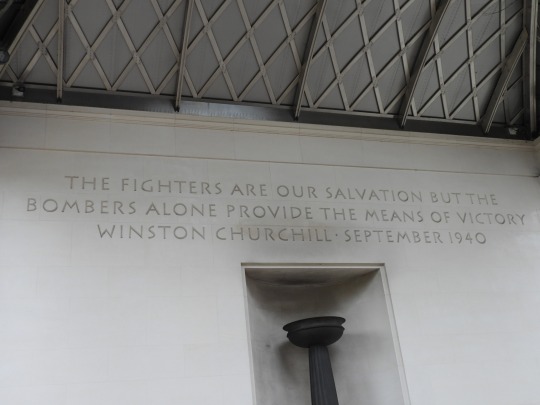
The Bomber Command Memorial was always going to controversial, even divorced from it’s commention to Tory political operator Lord Ashcroft. For seventy years after the war, RAF Bomber Command existed in between the moral necessity to commemorate its more than 55,000 dead, and the politicial impossibility of raising a monument to the men who destroyed Hamburg and Dresden. Proportionally, both for Australia and the Empire generally, serving in Bomber Command was the most dangerous and deadly occupation of either world war, with a staggering 44% death rate. (Not casualties. Deaths.) To fly a Lancaster (or a Halifax, a Wellington, a Stirling or any of the other less fashionable bombers) took immense courage. Yet this courage was used to pursue what Arthur ‘Bomber’ Harris called ‘dehousing’ - the deliberate targeting of civilian areas. This was controversial at the time, to the point where the Americans took it as a point of moral pride that they didn’t bomb in the British fashion (until towards the end of the war, where the gloves came off, particularly against Japan.) Today, it’s a huge issue that a lot of people are very sensitive towards.
I think the Bomber Command Memorial does it’s job as tastefully as is possible to do so - bearing in mind that it is not possible to do this in a way that would be tasteful for everyone. Yes, the men on the pedestal are elevated, and we look up at them, but we look up at figures with a distinct sense of weary resignation to doing an awful job. It is the statues that turn what could be seen as - and what Ashcroft probably intended to be - a blandly nationalistic piece. They give it a human quality. It’s also worth noting that once a memorial, like any other piece of art, is finished, the interpretation of the beholder becomes just as valid and important as that of the artist.
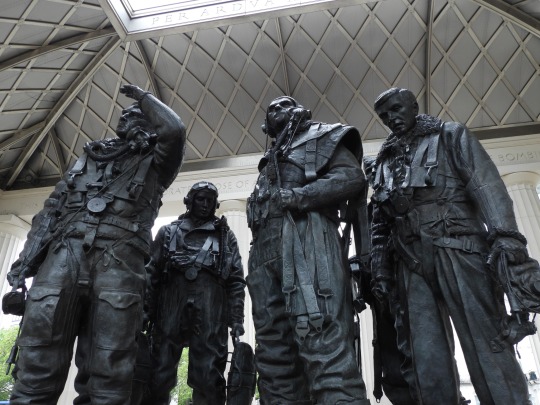
I won’t get into whether or not I think strategic bombing was tactically or strategically justified, although I will say that for a long time there weren’t many other ways to prosecute the war, and I’m hestitant to judge Harris or Churchill too harshly.
We crossed the road to the Wellington Arch, and here split up so that each group could examine a chosen war memorial. I’m not in a group, so I got to wander around and look at whatever took my fancy, so instead of the insightful commentary of my cohorts about WWI memorials, you get to hear me moan about a Napoleonic statue. Specifically, there’s a statue of Wellington that faces Aspley House, and a handsome statue it is, but there is something about it that bothers me intensely. On the base, standing guard at each corner, are soldiers from various regiments of Wellington’s Army - probably intentionally, they represent England, Scotland, Wales and Ireland. This is good - what bothers me is their choice of representatives. The Scots soldier is an infantryman of the 42nd (Black Watch) Foot, as is good and proper. The Welshman is of the 23rd Royal Welch Fusiliers, the Englishman is of the 1st Foot Guards, and the Irishman is of the 6th (Inniskilling) Dragoons. And therein lies the problem - they’re all from elite regiments. (Additionally, the Fusilier is a sergeant.) Were it up to me, I’d swap the Foot Guard for, say, one of the light infantry regiments - let’s say the 52nd Foot, just for an example - and the dragoon for the 28th (Inniskilling) Foot. Both of these regiments deserve recognition, and neither of them are part of the social elite of the army.
Some might say this leaves out the cavalry. Well, bugger the cavalry. It’s the infantry and the artillery that win wars, and the cavalry that take the credit.
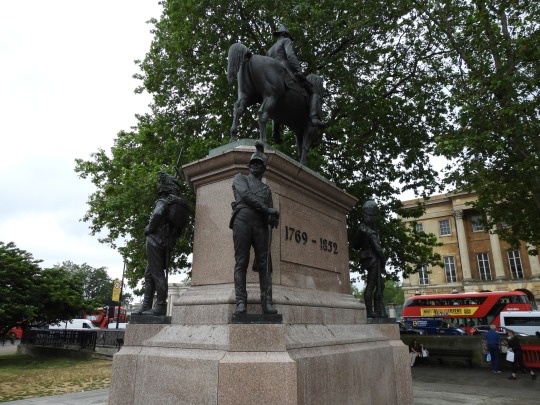
As for the other memorials, most of them were handsome enough. The Australian Memorial is a clever design; a wall in which, from a distance, one sees the name of battles, and when one comes closer they can see the small names of towns across Australia. The Machine Gun Corps Memorial is classical to the point that nobody would ever know what it was a memorial to unless they took a close look - it just looks like a naked Achilles making a jaunty pose. The New Zealand Memorial looks like somebody left their giant tent pins sitting in the side of a small rise, while the memorial to the Indian, African and Caribbean troops of the world wars is handsome but a little generic. It’s the Royal Artillery Memorial that really stands out, with it’s stone 9.2in howitzer and the weary figures of artillerymen standing sentinel around it. At the back is the stark image of a dead gunner, his body covered by his cloak and helmet. Below this anonymous casualty is an inscription - ‘here was a royal fellowship of death.’ It’s an outstanding memorial, and one of the standouts of the tour so far.

After presentations, we caught the Piccadilly Line from Hyde Park Corner to Piccadilly Circus, and from there took the Bakerloo down to Lambeth North. Here was the Imperial War Museum; it almost needs no introduction. Before the Australian War Memorial, before the hundreds of local memorials across the Empire, before the war had even ended, there was the everpresent IWM. Perhaps appropriately, the premises of the IWM used to be the infamous Bedlam asylum. We lunched here, and then looked around.
The IWM is undoubtedly a world class institution, and there was much to like about its famed First World War exhibit - it’s clearly global in scope, pays attention to the civilian as well as the military dimension, and has a number of artefacts one would never find elsewhere. Yet I could not help but see serious problems. A museum needs to keep things simple and accessible to the public, but some of the placards were so simplified that they actually made it more difficult to work out what things were. Take the Ottoman shoe one of our groups examined - it’s fascinating, but would it not be more fascinating to know where it came from? Was it recovered after the disaster at Salakamish, and does it thus have a connection to the ensuing extermination campaign against the Armenians? Or perhaps it came from Gallipoli, Mesopotamia or Palestine? Was the wearer a soldier, or a labourer behind the lines? Was he Turkish? Armenian? Arabian? Knowing where it came from could help us answer these questions and increase our understanding of history, all without making the placard unacceptably complicated.
There was also a giant naval gun standing in front of and obscuring the international uniforms (Italy, the Ottoman Empire and so on), and I just have to wonder what genius came up with that placement.

The Second World War wing had a lot of the same problems, but I can’t help but feel it was just a little better - less cluttered, slightly more context and information. It also had a lot of profiles of ordinary people involved in the wars - very quick blurbs about people to give the objects a more human touch. There’s also a bit on the Australians in New Guinea, complete with Owen Gun, so naturally that’s a big point in it’s favour. Upstairs there’s a temporary exhibit on the Troubles - I saw someone on Twitter who was absolutely infuriated that a British museum was talking about this, and I think they ought to look at it for themselves because I thought it was brilliant. At the top is the Lord Ashcroft Gallery of VCs, and all I’ll say about that is that I find the fact that Lord Ashcroft personally has the world’s largest collection of Victoria Crosses to be very disconcerting. As a great archeologist once said, ‘it belongs in a museum!’
(Yes, I know technically already in a museum, but the museum should own them.)
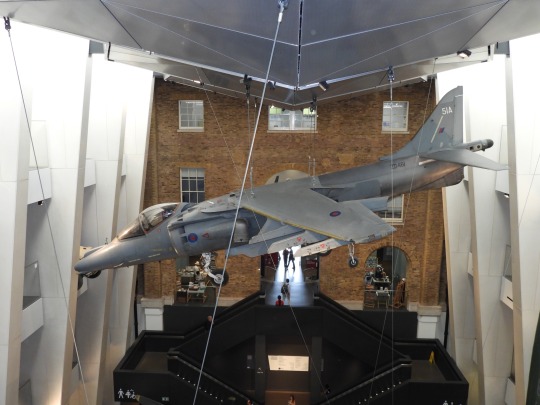
We finished around 4.30. I had dinner with mum at the Victoria Wetherspoons (review - it’s a Wetherspoons, you know what to expect) and then headed back in to write this. Tomorrow we get most of the day to ourselves, so I plan to duck down for a cheeky visit to the National Army Museum. But first an early rise, because there might - and I cannot absolutely confirm this - be something special in at Paddington…
#first world war#second world war#imperial war museum#bomber command#wellington arch#duke of wellington#royal artillery#british army#royal air force#the troubles
7 notes
·
View notes
Text

Yesterday on 01/20, we visited the Wellington Firebirds, one of the best cricket clubs in New Zealand. A very organized club with their own museum in their stadium. In the picture above is a cricket ball that was used during World War II. This ball has a big importance to sport of New Zealand, as it was used to ease the mind of these prisoners to play cricket, instead of thinking about the negative. This ball was donated to this museum because this stadium held the first ever cricket match in 1868, and the importance of cricket has spread throughout the world tremendously, impacting everyone in a positive way, just the way this ball did for these prisoners of war. Entry #11: The Museum
2 notes
·
View notes
Text

Today's Flickr photo with the most hits: this detail from a painting of Blucher and Wellington meeting on the field of Waterloo. As Blucher put it, "Quelle affair!".
1 note
·
View note
Photo

Wellington Museum Review: A FREE Quality Museum in Wellington Wellington Museum was where we sought refuge from the winds and rains on our second day in Wellington. Thankfully we found that Wellington Museum is... ( Open Link to Read More.. ) https://www.2bearbear.com/wellington-museum-review-a-free-quality-museum-in-wellington/
#2bearbear#attractions#freeentrywellingtonmuseum#freemuseumwellington#museum#NewZealand#nz#sglife#Singapore#theatticwellingtonmuseum#Travel#wellington#wellingtonattraction#wellingtonmuseum#wellingtonmuseumreview#wellingtonmuseumtimemachine#wellingtonmuseumtimetravel#wellingtonmuseumwahinedisaster#wellingtonmuseumwellingtonharbourboardroom
0 notes
Text


Shubbo drew himself!
13 notes
·
View notes
Text
Georgian Illuminations

View On WordPress
#Georgian Illuminations#Georgian-era#History#Light#Napoleon#Regency Era#Sir John Soanes Museum#Vauxhall#Vauxhall Gardens#Wellington
0 notes
Text

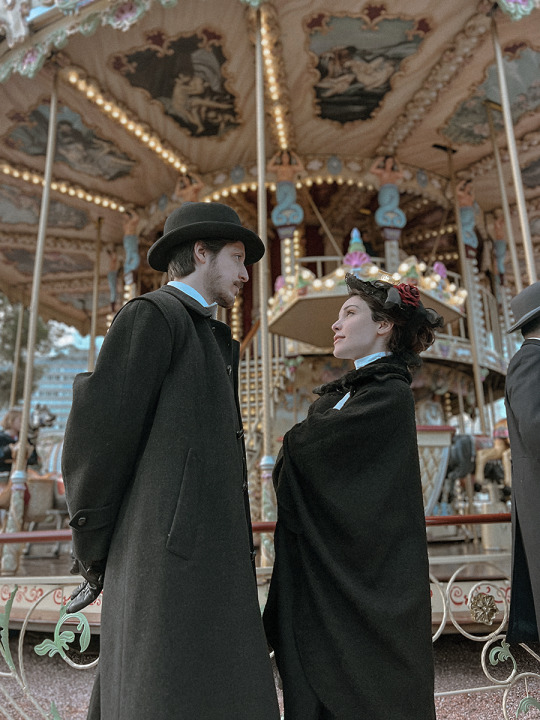


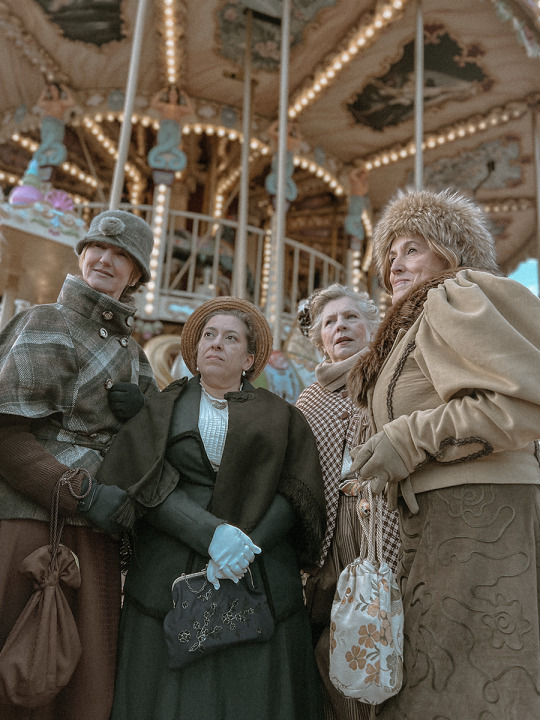
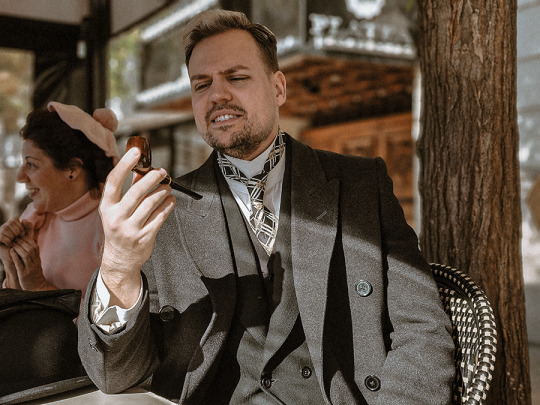
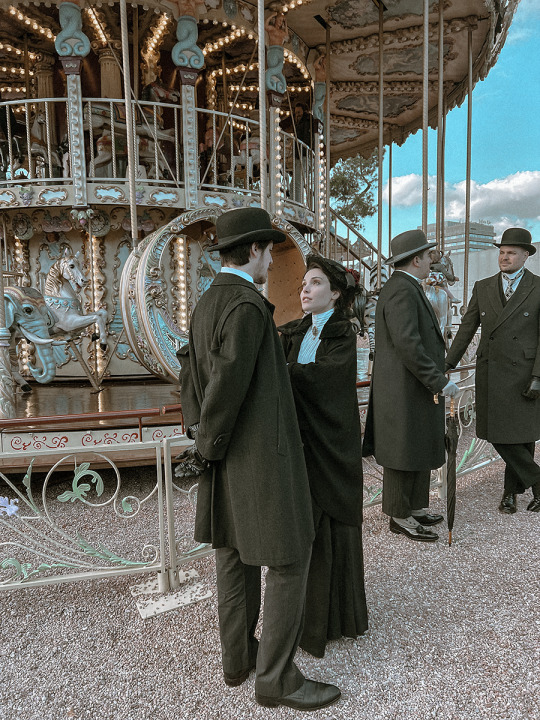
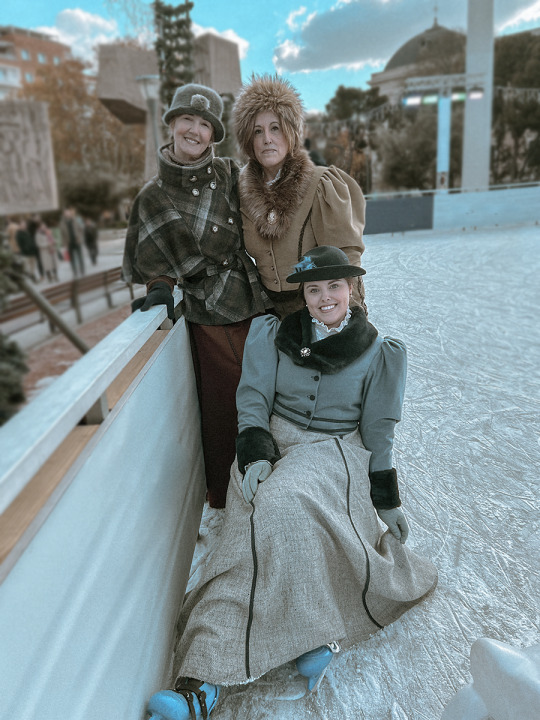
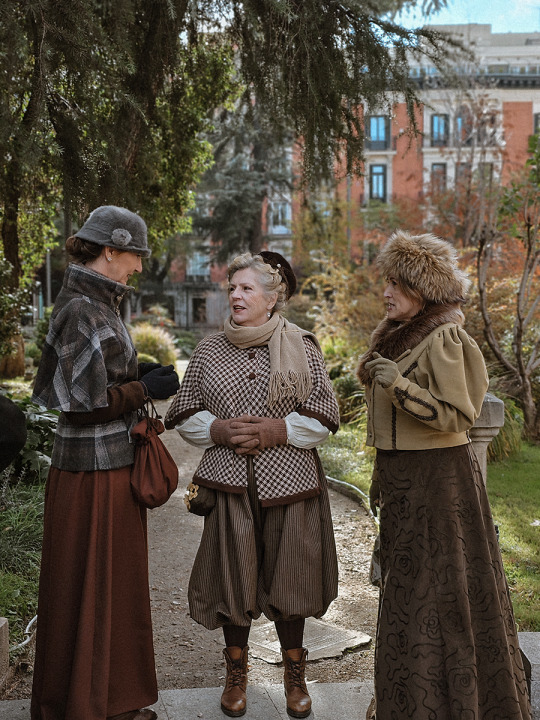



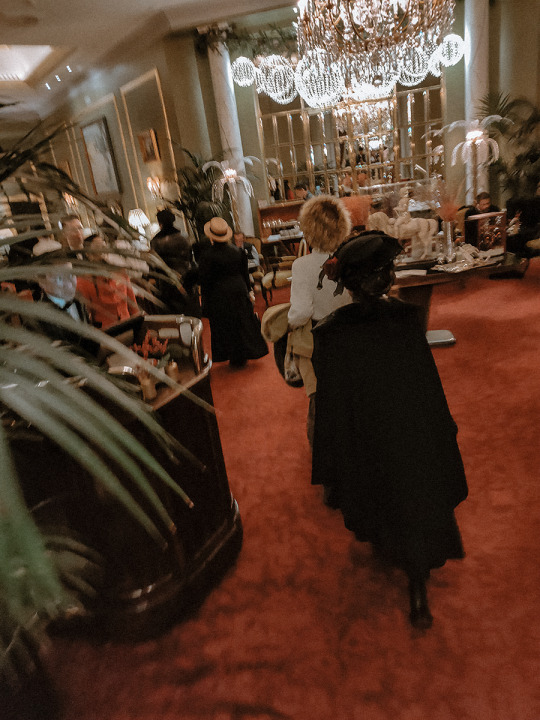
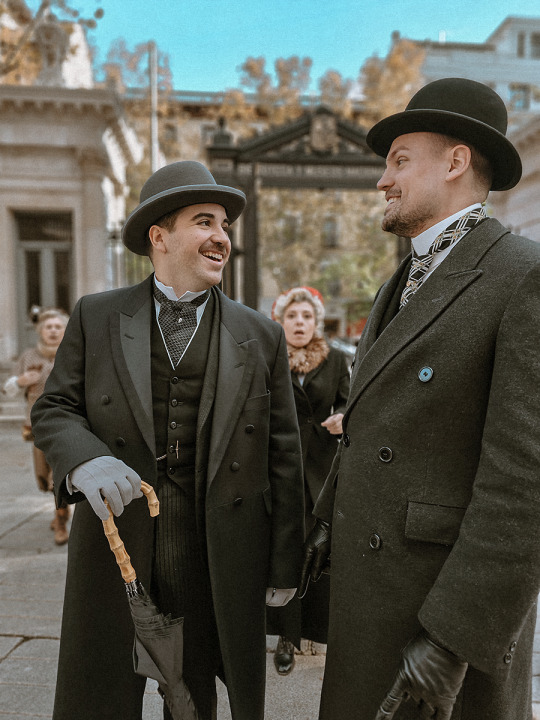

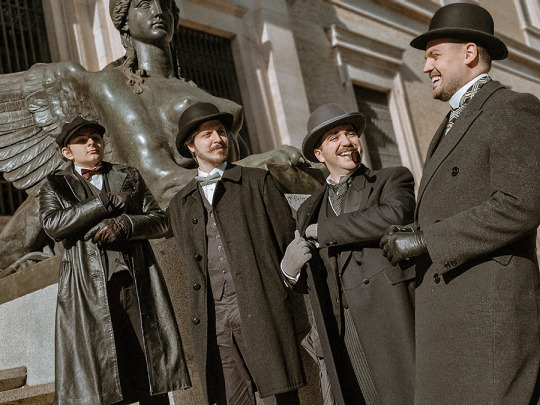
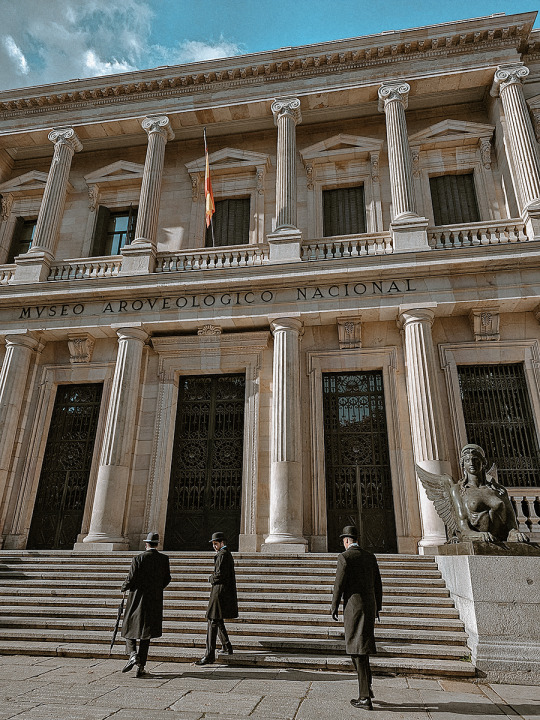
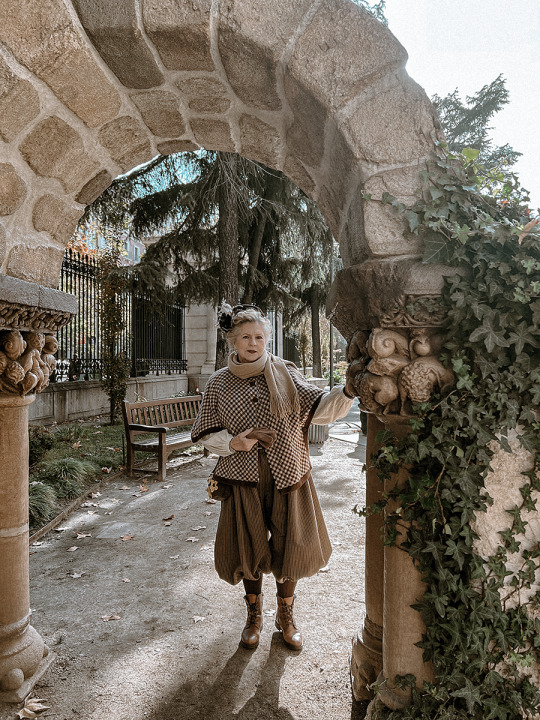

Some photos from a recreation we did a few weeks ago! 🥰 We went ice skating, visited the christmas markets and carrousel, took some photos at the archeological museum and had tea at the Wellington's café!
#nips photos#personal#edwardian#historical fashion#historical reenactment#everyone's winter outfits were so gorgeous on this recreation!! can you believe the ladies made them the week before!!#nips blogs
720 notes
·
View notes
Text
Walking Around Kensington Garden and Hyde Park
(I went hogwild with photos on the State Apartments tour of Kensington Palace so the KP photos are getting broken up into different posts.)

Approaching Kensington Palace from the Boardwalk in Kensington Garden. This is a resident's only gate (the visitor entrance is to the side) and a popular place for DIana's fans to leave flowers on the anniversary of her death.

Entering the visitor's gate.
Yep, that's 1A on the left. And yep, those windows in the state apartments (the building on the right) overlook their walled garden. But you can't actually see anything - all of the windows with a viewpoint of the 1A garden has privacy film on it that blurs the view. It's very good privacy film. Believe me, I tried.

A head-on view of the KP 1A garden.

KP with the Queen Victoria statue. It was designed by one of her daughters.

The visitor's entrance to the State Apartments. The pergola was installed as part of the Diamond Jubilee celebrations.

A close-up of the pergola.

Part of the Memorial Gates, at the corner of Hyde Park. It's also called the Commonwealth Memorial Gates, celebrating armed forces from India, Pakistan, Sri Lanka, Bangladesh, Nepal, Africa, and the Caribbean who served for Britain in the world wars.
The collection of wreaths and flowers there on the left are the tributes from the previous year's Remembrance Day at the Cenotaph.

Close-up of the tributes

About the Memorial Gates.

The Royal Artillery Memorial, a WW1 memorial.

Another view
It was startling to see people climbing on the memorial for photos or to take a closer look, like in this photo and the one above. At most of the DC memorials, visitors don't get this close unless the memorial is designed to be interactive, like the Vietnam War Memorial.

Side view

A closeup of the inscription

The Australian War Memorial

A closeup

Another view

The Wellington Arch

A close-up of the gates at Buckingham Palace

Peeking through the gates at the iconic balcony

The Diana Memorial Walk covers seven miles and takes you around to places associated with Diana during her life.
The Jubilee Greenway is a walking and biking route through central London celebrating The Queen's Diamond Jubilee, the 2012 Olympics, and the 2012 Paralympics.

I did the Buckingham Palace Summer Opening. No photos allowed inside, but we could take all the photos we wanted once in the gardens.
While I was on the tour, there were dozens of people taking covert photos (and video) of BP. I am too Type A to even think about trying, but I did get the souvenir book and I was happy with that!
The theme for the 2018 Summer Opening was about Charles, celebrating his 70th birthday and the upcoming 50th anniversary of his Prince of Wales investiture. I remember one of the rooms was filled with gifts he had received throughout his life. I don't remember much specifics, but they were all really beautiful. Some of the tapestries that Charles had received were absolutely stunning.

Another view of the back of Buckingham Palace.
Under those tents on the patio was a small cafe and a children's activity area. There was also a gift shop but it was separate from the palace, set up in trailers next to very fancy portapotties.
Speaking of gift shops, Paul (the tour guide) is very upset with Banksy because the title of Paul's tour guide memoirs was going to be "Exit Through the Gift Shop" - because nearly every tourist destination, museum, and cultural attraction ends with a gift shop. Unfortuanately for Paul, "Exit Through the Gift Shop" is the name of Banksy's excellent documentary.

Some of the gardens at Buckingham Palace.
To exit the Summer Opening tour, you leave through one of the garden paths. It's a great way to see some of the foliage and a lot of the plants, and very serene.

Another view of the gardens, with Buckingham Palace peeking through.
Not pictured is the ice cream pavilion tucked away in the woods. It was a wonderful sweet treat! (You bet I got some Buckingham Palace ice cream.)

Leaving London, en route to Heathrow. When the driver learned that I'd come to celebrate my birthday in England and that I loved the royal family, he took a special detour to take me down The Mall so I could see the view of Buckingham Palace on approach. It was splendid.
Still to come - the KP State Apartments Tour, the Victoria exhibit, the tiaras, the Diana exhibit, The Crown's costume exhibit, and a whole bunch of Harry Potter.
48 notes
·
View notes